Key Takeaways:
- Most people with desk jobs can return to work in 1-2 weeks, while physically demanding jobs require 4-6 weeks of recovery.
- Your recovery timeline depends on the type of surgery, your pre-surgery health, and how well you follow post bariatric surgery guidelines.
- Planning ahead for meal preparation, hydration, and stress management is essential for a successful transition back to the workplace.
So you’ve made the big decision to have bariatric surgery, and now you’re wondering about getting back to your normal life, especially work. While you might be eager to return to your regular routine, giving your body proper time to heal is incredibly important.
Whether you’ve already had your procedure or you’re planning ahead, understanding the typical bariatric surgery recovery time and what factors might affect your personal journey can help you set realistic expectations.
Table of Contents
General Recovery Timeline for Returning to Work
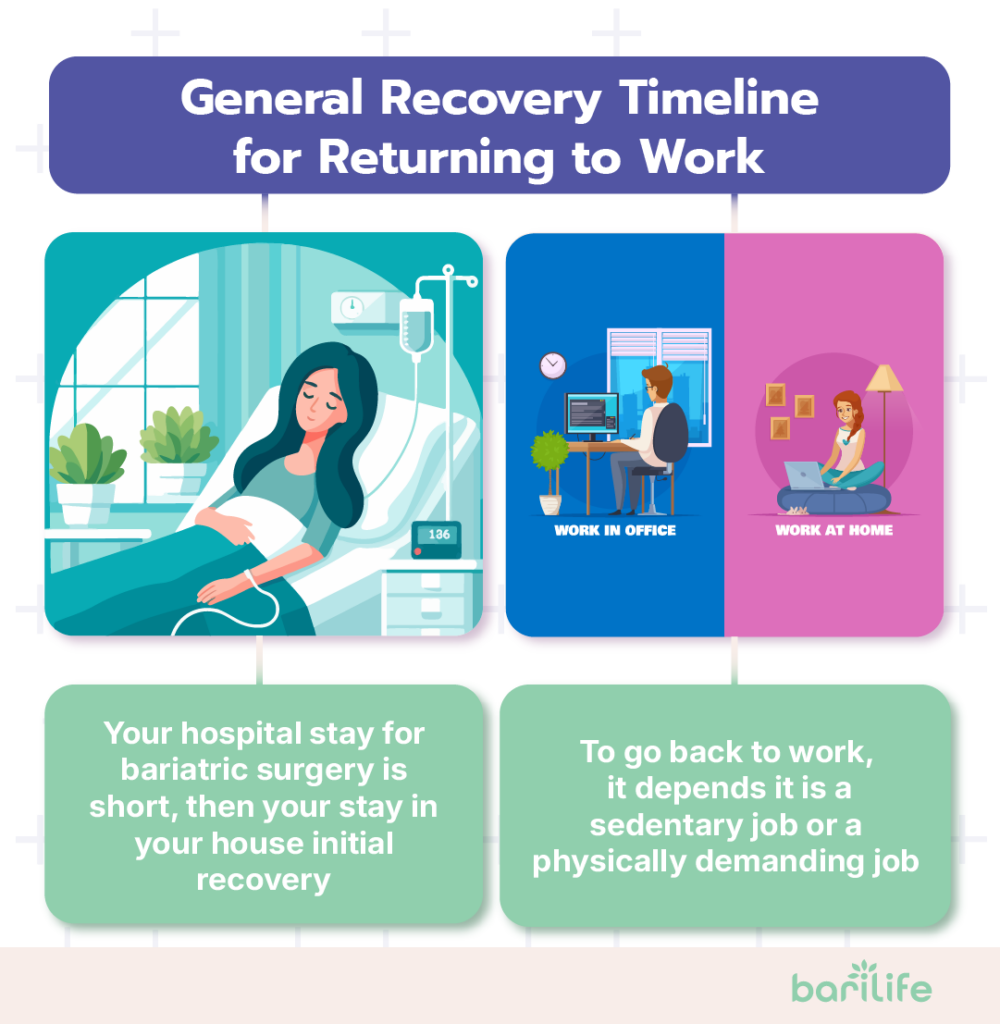
Here’s an idea of what you can expect for recovery after bariatric surgery.
Hospital Stay
First things first, after your surgery, you’ll likely spend one to three days in the hospital. This gives your medical team time to monitor how you’re doing right after the procedure. They’ll check your vital signs, make sure you’re managing pain effectively, and confirm that you’re able to take small sips of water without problems.
Initial Recovery Period
Once you’re home, you’ll enter what doctors call the “initial recovery period.” This typically lasts about one to two weeks, and it’s a crucial time for healing. During this phase, your body is working overtime to repair tissues, adjust to your modified digestive system, and adapt to your new dietary needs.
You’ll be advised to rest at home, but that doesn’t mean staying in bed all day. In fact, walking around your house is highly encouraged to prevent blood clots and promote healing.
Return to Work
Now, for the big question: how long do you need to be off work after bariatric surgery? The answer depends largely on what type of work you do.
- Sedentary jobs: If you have a desk job where you mostly sit and don’t do heavy lifting, you might be able to return to work as soon as two to three weeks after surgery.
- Physically demanding jobs: If your job requires lifting, bending, pushing, or other strenuous activities, you’ll likely need to wait four to six weeks before returning.
Keep in mind that how long you need to be off work varies from person to person. These are just general guidelines. Your surgeon will provide recommendations based on your situation.
Factors That Influence Recovery Time
Here are several factors that influence when you can return to work after bariatric surgery.
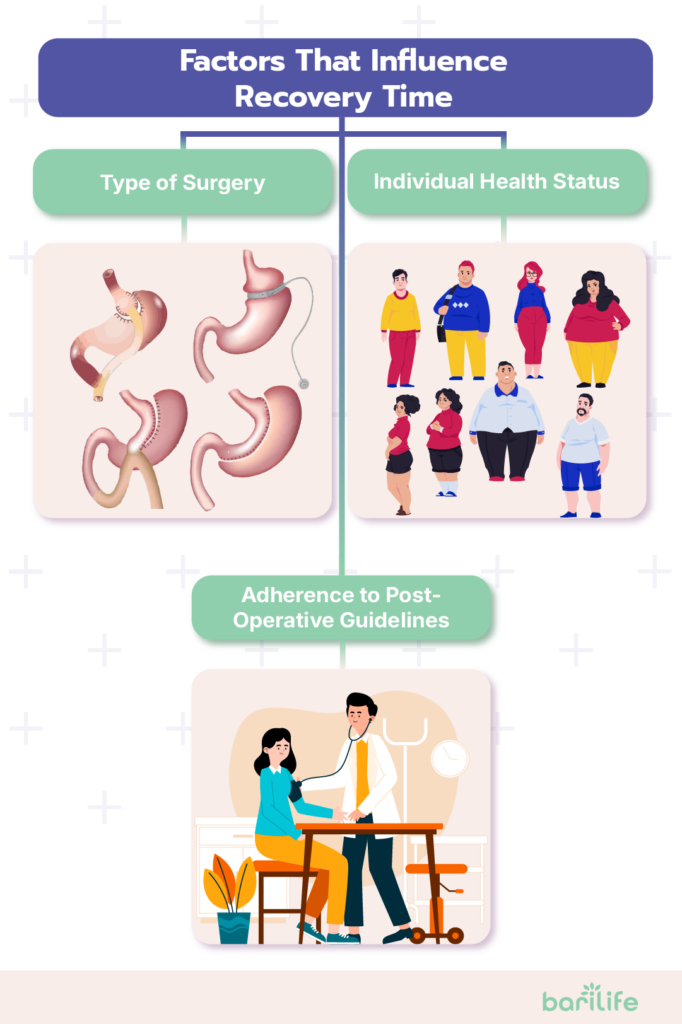
Type of Surgery
The specific procedure you have makes a big difference in your recovery timeline. Minimally invasive procedures like laparoscopic sleeve gastrectomy or gastric bypass typically have shorter recovery times than traditional “open” surgeries.
With laparoscopic surgery, your surgeon makes several small incisions rather than one large cut. This usually means less pain, smaller scars, and a quicker return to normal activities, including work.
Individual Health Status
Your overall health before surgery greatly affects how quickly you bounce back. Factors that can influence your recovery include:
- Age
- Pre-existing health conditions
- Weight before surgery
- Fitness level
Be realistic about your personal health situation when planning your return to work.
Adherence to Post-Operative Guidelines
Following your doctor’s instructions after surgery can dramatically affect how quickly you recover. This includes sticking to your post-op diet plan, taking prescribed vitamins and medications, drinking enough fluids, and doing recommended gentle exercises.
The better you follow these guidelines, the quicker your recovery is likely to be. This isn’t the time to experiment or take shortcuts—your body is healing from major surgery.
Tips for a Smooth Transition Back to Work
Follow these tips to help you transition back to work.
Gradual Resumption
Even when your doctor gives you the go-ahead, consider easing back into your work routine rather than jumping in at full speed.
If possible, start with part-time hours or work from home a few days a week. If your job involves physical labor, speak to your employer about possibly modifying your duties temporarily. This slow approach gives your body enough time to adjust to the increased activity level while continuing to heal.
Meal Planning
One of the biggest challenges of returning to work after bariatric surgery is sticking to your new eating routine. The workplace is full of temptations and challenges—from birthday celebrations with cake to lunch meetings at restaurants.
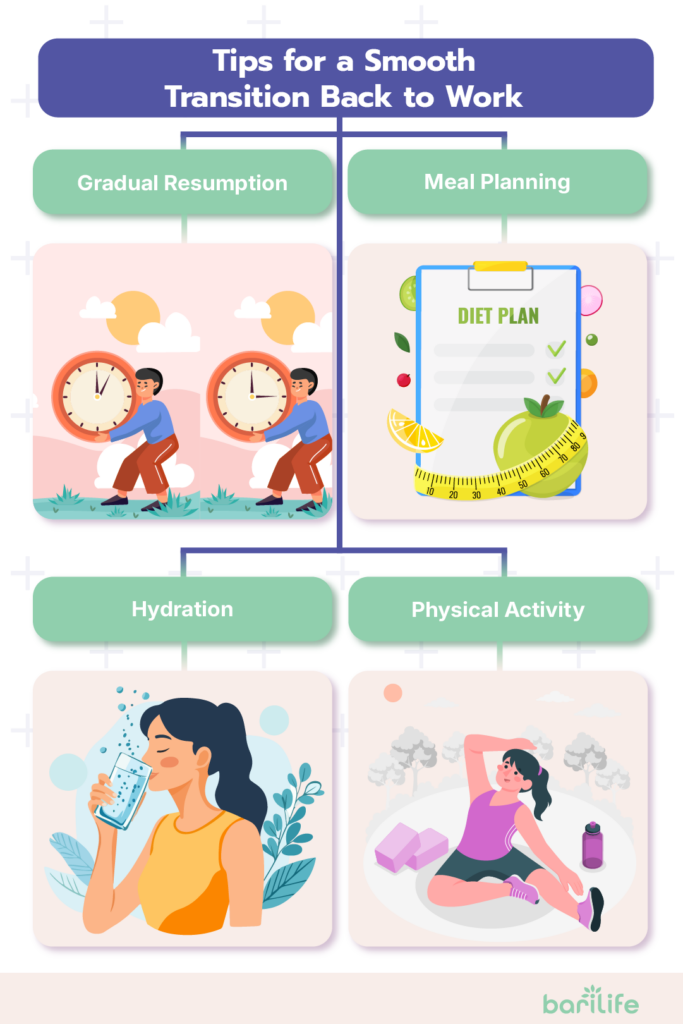
Prepare ahead by packing appropriate meals and snacks that adhere to your post-op diet plan. Using portion-controlled containers can help you manage your new eating requirements.
You might need to set alarms to remind you to eat, since your new stomach won’t growl the same way it used to.
Your new eating habits are a medical necessity, not a lifestyle choice. Don’t feel pressured to eat foods that aren’t on your plan just to fit in with coworkers.
Hydration
After bariatric surgery, staying hydrated is crucial—but it’s also challenging because you can’t drink large amounts at once. At work, keep a water bottle at your desk or workstation and take small sips throughout the day.
Aim to drink water consistently between meals (not with meals, which can cause discomfort). If your job makes regular water breaks difficult, talk to your supervisor about it. Proper hydration isn’t just good for your recovery—it impacts your energy levels and ability to think clearly, too.
Physical Activity
Even after returning to work, continue incorporating movement into your day. Take short walks during breaks, stand up and stretch regularly if you work at a desk, or use the stairs instead of the elevator if you’re able.
These small activities help prevent blood clots, reduce swelling, improve circulation, and boost energy. They’re also a great starting point for an active lifestyle that will help you maintain your weight in the long term.
Stress Management and Mental Health
The emotional aspects of bariatric surgery can be just as challenging as the physical recovery. Many patients experience mood changes, relationship adjustments, or identity shifts as their bodies change.
Recognize your personal stress signals, which might include feeling overwhelmed, having trouble sleeping, or experiencing headaches. When you notice these signs, take them seriously—they’re signals that your body and mind need extra care.
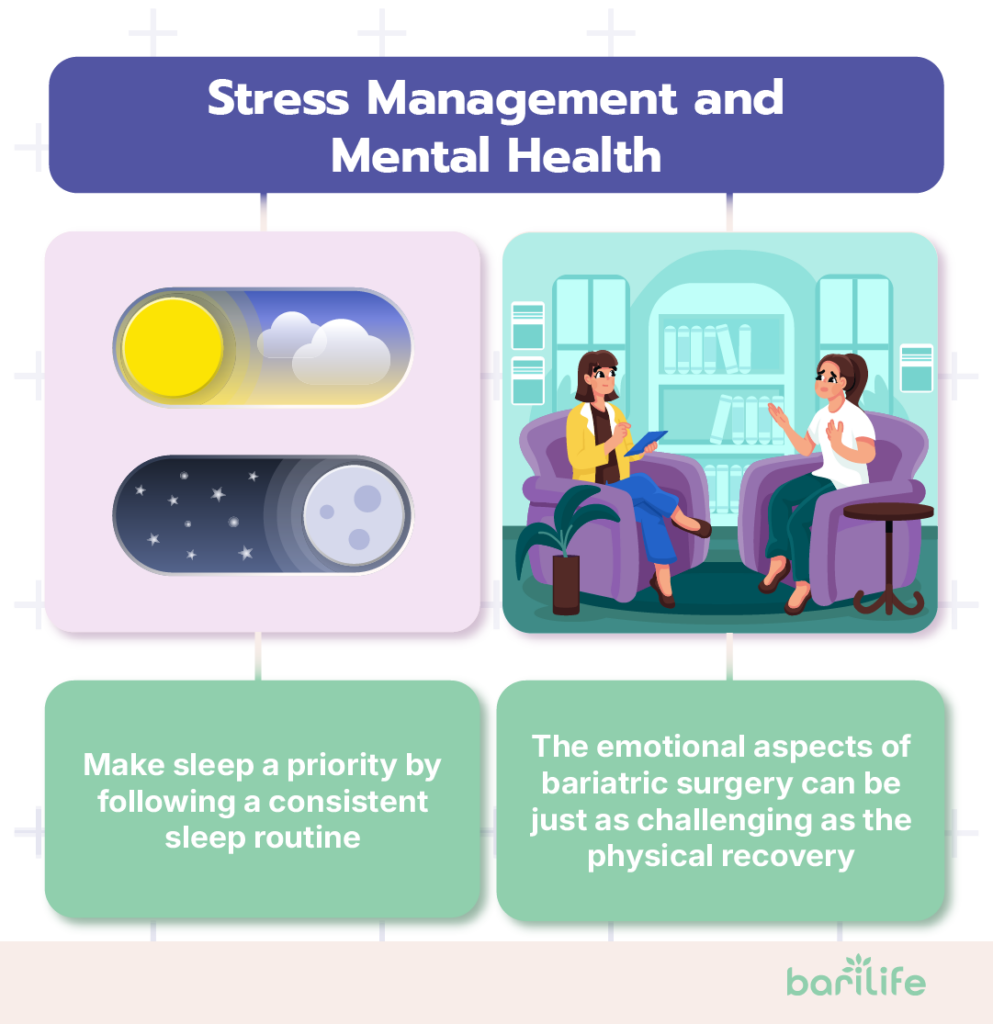
Even after you’re back at work, your body is still healing and needs more rest than usual. Make sleep a priority by following a consistent sleep routine and by making your bedroom as relaxing as possible.
Connecting with others on the same journey can be really helpful. Consider joining a bariatric surgery support group or working with a therapist who has worked with bariatric patients.
When to Delay Returning to Work
Sometimes, despite your best efforts to plan ahead, your body simply needs more time to heal. Consider delaying your return to work if you’re experiencing persistent pain or fatigue that doesn’t improve with rest. Other warning signs include nausea or vomiting that prevents you from staying hydrated or any signs of infection at your incision sites (redness, warmth, discharge, or fever).
If you’re still struggling to follow your post-operative diet or having trouble staying hydrated, it might be wise to delay returning to work. The stress and schedule constraints can make these challenges even harder to manage.
When to Seek Medical Advice Before Returning to Work
Contact your healthcare provider before returning to work if you’re experiencing ongoing nausea or vomiting, persistent abdominal pain, or if you’re having difficulties eating or drinking as recommended. Excessive dizziness or extreme fatigue are also warning signs that need attention.
Never ignore potential signs of infection. If you have a fever above 100.4°F (38°C), notice increasing redness or swelling around your incision sites, or see any discharge from your incisions, call your doctor right away. Infections need prompt treatment to prevent more serious complications.
Pay attention to symptoms that might indicate nutritional problems. If you’re experiencing unusual weakness, dizziness, or hair loss beyond what your medical team told you to expect, you might have nutritional deficiencies that should be addressed.
Conclusion
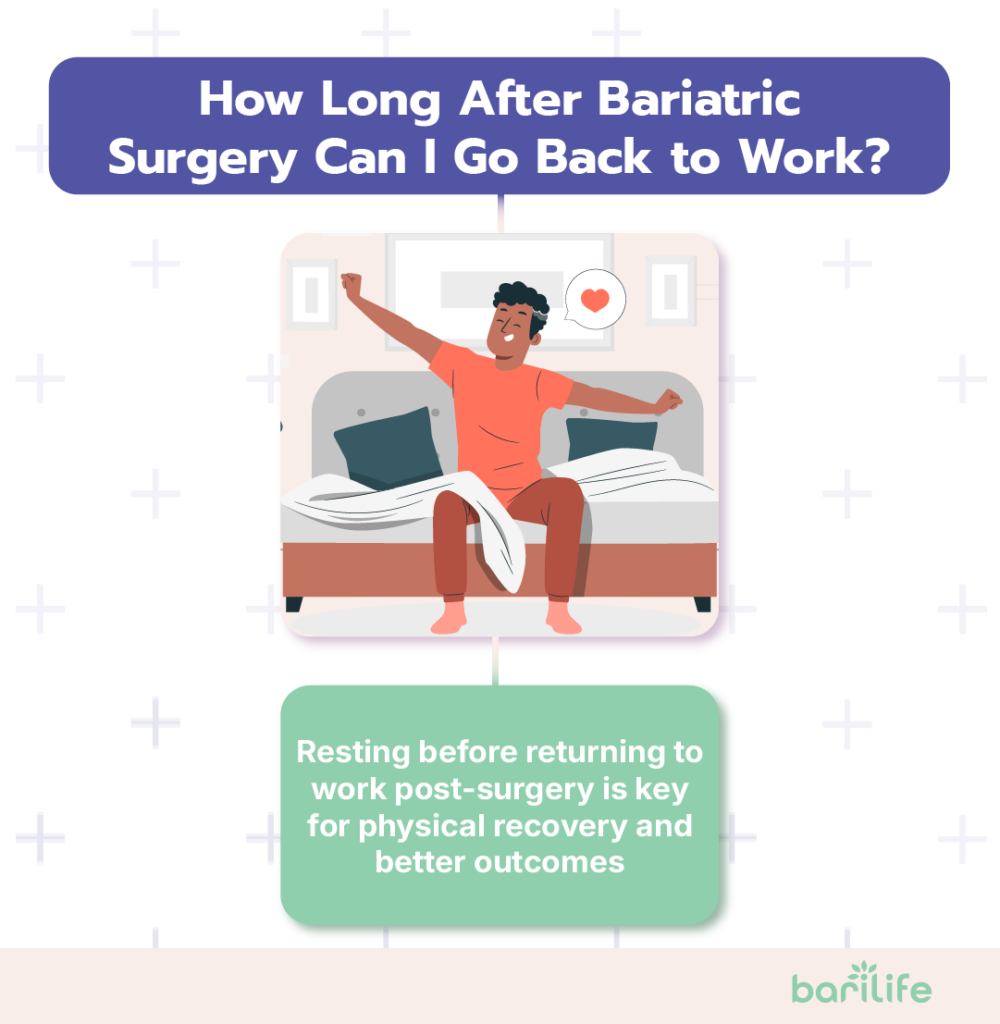
Bariatric surgery is a significant procedure, and getting enough rest before returning to work is not just for physical healing—it’s also giving yourself the best chance for success. By taking time off, returning to work gradually, and listening to your body’s signals, you’re setting yourself up for a healthier future.
While guidelines are helpful, the most important thing is to work closely with your medical team to determine the right timeline for you. Don’t compare your recovery to others or feel pressured to return to work before you’re ready.
By giving yourself permission to heal completely before returning to your full work schedule, you’re making an investment in your long-term health. After all, this surgery is a tool to help you live a healthier, more fulfilling life—and that includes a healthy relationship with work.
How Bari Life Can Help
Bari Life’s specialized supplements can help make your transition smoother and support your ongoing recovery after surgery. Our comprehensive bariatric vitamins and minerals are specifically designed to address your unique nutritional needs, helping prevent deficiencies that could slow your healing and affect your energy levels at work.
We offer a range of bariatric vitamins chewable and liquid bariatric vitamin options to suit your preference and absorption needs. For patients who require additional support, our bariatric multivitamin with iron formulations ensure you’re meeting both vitamin and mineral targets post-surgery.
For busy workdays, our convenient bariatric protein shakes and bariatric protein bars make sticking to your post-op nutrition plan simple and satisfying. These high-protein options are crafted to support energy and lean muscle preservation.
To help curb cravings while staying compliant with your dietary guidelines, we also offer a selection of bariatric snacks—ideal for the office or on the go.
Don’t overlook calcium and digestive support: Bari Life provides bariatric calcium chews for bone health and a dedicated bariatric probiotic to promote gut balance, both critical for long-term recovery and wellness.
Finally, if you’re struggling with thinning hair, we carry bariatric vitamins for hair loss that specifically target post-surgical deficiencies that commonly affect hair health.
Visit Bari Life today to discover how our full range of bariatric-specific products can support your return to work and help ensure the long-term success of your weight loss journey.
If you want to learn more, why not check out these articles below:
- Vaping After Bariatric Surgery
- How Long After Bariatric Surgery Can I Drive?
- How Long After Bariatric Surgery Can You Swim?
- How Long After Bariatric Surgery Can You Have Sex?
- Why Are You Not Allowed To Use a Straw After Bariatric Surgery?
Resources
Bariatric Hydrating Liquids. (2018). UW Medicine.
Laparoscopic (keyhole surgery). (2023). NHS.
VAAAHS Surgical Services. (2025). U.S. Department of Veteran Affairs.



What are your tips and tricks to post-bariatric success?